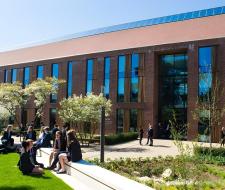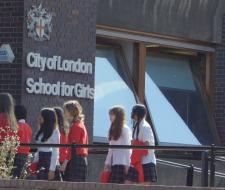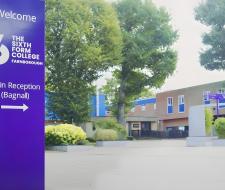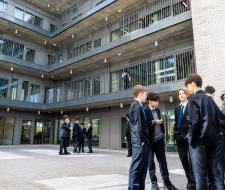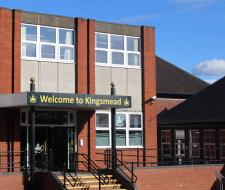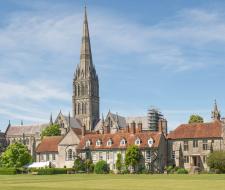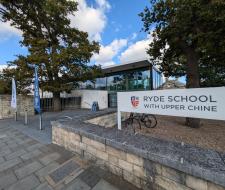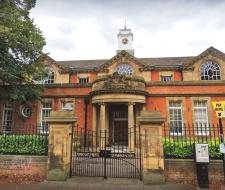Secondary education in England UK for international students
- Studying at 100 best schools in UK for foreign students
- Advantages of getting primary and secondary education in best schools in England and colleges
- Studying in TOP-100 UK secondary schools and colleges for foreign students at the age of 14, 15, 16 years old
- Tuition fees at 100 best schools in England
- Studying at best schools in UK for students under 11 years old
- Literature and references
This content was developed and approved with active participation of Chris Skidmore.
In the process of preparing the material, we referenced the following sources:
- https://www.hmc.org.uk/about-hmc/projects/the-british-education-system/
- https://en.wikipedia.org/wiki/Public_school_(United_Kingdom).
SMAPSE team presents a list of best schools in UK and private day schools offering high-quality secondary school education in England. Nowadays, education in the United Kingdom takes an essential place among students as secondary education received in Great Britain will be the first step to a future successful career.

Finishing a school in England acquires not only brilliant language skills, but also gives equal rights with the British children to enter the best universities in the country and in the world. A young specialist with a diploma from respected British university can reckon on successful employment in any international company.
SMAPSE team is aware of parents stress concerning problems of adaptation in a new place and to a new linguistic and cultural environment. Our experts confirm you that, practically, there are no problems as best schools in England and day schools create perfect conditions for comfortable living and studying of international students.
Don't hesitate to address the samples of entrance tests for admission to private boarding schools abroad, which you can complete in our office without visiting the school itself. SMAPSE services regarding admission are also free.
Alternative destinations
Studying at 100 best schools in UK for foreign students

In England, foreign students receive primary and secondary education solely in private schools. There are two main types of British private schools:
- Boarding schools. There students learn and live on campus. Moreover, they are under the watchful eye of qualified educational stuff. It's interesting to note that parents often choose such schools for security reasons;
- Day schools. Students live in British families or live with their parents and attend classes. According to psychologists, this type is more suitable for independent children who can live on their own.

Moreover, there is a possibility of choosing a private boarding school or day school which is open only for boys or only for girls. Traditionally, they maintain a more strict discipline. It is worth noting that in terms of academic achievement and acquired knowledge, separate and joint educational institutions are identical.
The price for secondary education in the United Kingdom can vary significantly depending on the rating of the institution and living conditions. The highest price of british school education is mostly in secondary schools in London. For high school students, the type of the selected programme is also taken into account.
For exact information concerning tuition fees in particular educational institution, you may contact SMAPSE experts at any time.
Advantages of getting primary and secondary education in best schools in England and colleges

Education for all British children at the age of 5-16 years old is compulsory. From an early age, foreign students can study the same national education programme that is offered to the British students. There are nurseries and kindergartens for kids at the age of 3-4 years old: here children learn to count, write and read in a playful, unostentatious and pleasant way.
Children can attend classes in the primary school in the United Kingdom from the age of 5 to the age of 10 years old. Primary education ends with SAT exams or Common Entrance Examinations. Secondary education is provided for pupils between the ages of 10-11 and 16 years old. Students of the secondary level of education system often choose the GCSE programme that lasts for 2 years. After that students take 8-10 exams and receive a diploma of complete secondary education. There is an opportunity to get a certificate of General National Vocational Qualification, or GNVQ, instead of GCSE, especially if you are planning on doing a career in some sphere of labor market.

At 14-15 years old students can enter upper school or high school. The programs offered on this level of education prepare students for university education.
Primary education in England also has many advantages. From relatively easy adaptation to acquiring equal rights with the British children to entering prestigious universities of Great Britain and the rest of the world. The main goal of primary and secondary education is preparing students for admission to higher education institutions. For foreign students who received a certificate of secondary education at homeland, there are A-Level programme, BTEC, International Baccalaureate, Foundation programme. Students at the age of 16-18 years old get education in the 6th Form which encompasses either A-level programme, International Baccalaureate or Cambridge Pre-U. It's a two-year programme that helps students prepare for the university most effectively.

The academic year in the United Kingdom of 38 weeks is divided into three trimesters:
- Autumn – from September to December;
- Spring – from January to March;
- Summer – from April to the beginning of June.
Every particular private boarding school or private day school can establish their own exact duration of each trimester independently. However, do not forget about the holidays: there are always short weekly intervals in the middle of each trimester and long Christmas, Easter (2-3 weeks) and summer (6 weeks) vacation.

Students study from Monday to Friday: usually lessons start at 9:00 and last to 15:00. Then breaks for lunch are provided. Saturday is a traditionall day for excursions, major events, sports activities, classes in creative studios and elective courses. Sunday is a weekend day.

What do children study at English private boarding and day schools?
The United Kingdom has adopted a unified school curriculum called “The National Curriculum”. However, top secondary schools in UK and private day schools can establish their own educational programme with an emphasis on certain areas of knowledge. Actually, the curriculum includes the following subjects:
- English language and literature
- Mathematics
- Natural sciences
- 1-3 foreign languages (both modern and classical)
- History
- Geography
- Information and Computing Technologies (ICT)
- Music
- Art
- Dramatic and theatrical skill.

Almost all British secondary schools include physical activities and sport sections that are compulsory to attend. There is also a great deal of electives. Traditional British sport such as horse riding, cricket, sailing, football, rugby, hockey, netball and tennis are especially popular with the foreign students.
If the school is adherent to a Christian church, there may be theology lessons like history of world religions. Note that there are private boarding and day schools, where attendance of the Sunday service is obligatory for students. If the educational institution follows the traditions of classical humanitarian education, the emphasis will be placed on the study of languages, including Latin and Ancient Greek, linguistics and philology.

There are always a large number of electives and additional lessons that a student can attend at his own desire. Achievements in the academic field provide an opportunity to qualify for scholarships or financial grants; as well they can help determine the priority disciplines at the A-level programme, with the desired specialization at the university and career direction.
The child's life at English private boarding school
Secondary schools in UK have large territories with administrative and educational buildings, residences for living, sport infrastructure, gardens and lawns, theaters and concert halls, sometimes even churches, chapels and museums. The whole territory is carefully guarded and outside access is strictly prohibited.

Children are living in the dormitories, which are divided into rooms. Usually 2-4-seat options but high school students in the 6th Form usually occupy private bedrooms. It is because of more complex and persistent studies and the need for personal space and silence for self-training. Along with the children, teachers and other stuff also live on a constant basis in the residences. They can always help each student and they are able to resolve any complex conflict situation. There is often a medical center and a department for in-patient treatment, large dining rooms for board meals, and sometimes student kitchens in residences.

Education in England for foreign students is also distinguished by a unique feature - custody. A care-taker is compulsory for every child studying in the United Kingdom under 18 years of age. This is stated in the Children's Act 1989 and the Child Protection Act 1999. Care-takers are chosen from trustworthy, law-abiding and respected British citizens. The duties of the care-taker in relation to his ward include:
- Represent the interests of the child in administrative institutions;
- Supervising a child, providing accommodation on holidays and long weekends, for illness or suspension (or providing accommodation if the child is on full-board basis and for some reason does not live on the school campus);
- Constant communication with parents;
- Visiting school meetings and events;
- Controlling student's financial expenses, payment of accounts, provision of pocket expenses (approved by parents).

In fact, the care-taker serves as a "temporary parent" to each child for the time of his separation from the family. The database of care-takers is constantly checked and verified.
SMAPSE experts will help you award a contract with one of the best agencies so that you were absolutely calm for the safety and comfort of your child in the United Kingdom.
Studying in TOP-100 UK secondary schools and colleges for foreign students at the age of 14, 15, 16 years old

Students at the age of 14, 15, 16 years old, who graduated from secondary and high school in their home country have several options for continuing their education in Great Britain:
- Firstly, students at the age of 16 years old can enroll in the International Baccalaureate programme, get the certificate of completion, which will allow to enter any leading university in the world;
- Secondly, students after 16 years can enroll in the A-level programme, which is a classic 2-year preparation course for the university. It allows entering the best higher educational institutions of the United Kingdom, including Oxford, Cambridge, LSE, UCL, etc. Purposeful and motivated students can enroll in the Pre-U programme, aimed exclusively at enrolling in Oxbridge universities.
- Thirdly, enter the GCSE programme at the age of 15-16 years. The additional year of GCSE will allow the child to adapt to the British educational system without missing out the most important material in the secondary school. This programme is considered to be the basis for the A-level and the standard of the British pre-university preparatory system.

Basic rules for entering British secondary schools
Actually, foreign students enter English best schools in UK or day schools at the age of 11-13 years old (which corresponds to middle school programs and preparation for GCSE). During this period it is easy to adapt to separation from relatives, to a new academic, linguistic and cultural environment. If a child is well motivated, hardworking and disciplined, has good knowledge of subjects and the English language, he can apply at the age of 14 directly to the GCSE course.

Many schools offer boarding (tuition and accommodation) for foreign students at the age of 7-10 years old. At this age a child is most susceptible and adoptive to learning new languages. It is worth noting that by the end of the 6th Form he will know English practically at the level of the native speaker. This is a significant advantage for enrolling in most elite private boarding schools and day schools, colleges and universities.
If you doubt whether the child will cope with the United Kingdom's academic programs, try to spend an academic trimester abroad. Nowadays, a great deal of educational institutions provide such opportunity today. It is an excellent opportunity to adapt to new conditions, to test the level of knowledge of both the subjects and the English language.

Frankly speaking, TOP-100 British private boarding and day schools are interested in the national diversity of their students. Practically, in any institution, 10% of students are foreigners. If you are planning to enroll in an English school, you will have to undergo several stages:
- Register and apply for a place in a private boarding or day school. It is better to do this as soon as possible (2-3 years before the expected start of studies): the more elite and prestigious is the chosen school, the sooner an application must be submitted;
- Collect and send a package of documents to the admissions office: assessments (for 2-3 years), the characteristics of the student, the recommendations of teachers (particularly those of Maths and English teachers), the results of passed examinations, various letters and gratitudes, medals and awards;
- To pass a personal interview with a representative of the school administration or director (in most cases this can be done by Skype);
- Provide a certificate of sufficient English proficiency - in the UK this is IELTS certificate. The older the student is, the better command of English he must show. For middle classes the requirements start from IELTS 4.5, but for high school and the 6th Form the passing score is usually not lower than IELTS 5.0-5.5;
- Prepare to pass several subject examinations. Usually this is the requirement of the most prestigious top secondary schools in UK: mathematics, natural sciences, internal English exam, academic essay, etc.
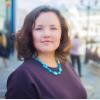
At what age do foreign students usually enter UK schools?
The optimal age is 14-15 years. This is the stage when the student adapts to the new educational system as quickly as possible. Moreover, at this age, very important exams are passed, which will be taken into account by universities when entering in the future.
Tuition fees at 100 best schools in England
The price of education in the United Kingdom varies depending on the rating of the institution, the results of the graduate examinations, prestige and history of a private boarding school, day school or college. Estimated cost is between 14 000 GBP and 25 000 GBP per year (full-board without living on campus in a residence), in a boarding school (that is, implying living on campus) – between 30 000 GBP and 40 000 GBP per year.

Studying at best schools in UK for students under 11 years old
In the UK students between the ages of 3 and 7 attend special programs to prepare for primary school. Such programs, in fact, is a preparation for the school itself. Students aged 7 to 11 years are engaged directly in the preparatory programs after which they pass the final testing. The results of testing determine the future fate of students: in case of success, students continue their education in an average educational institution.
It is worth noting, despite the steady increase in the number of educational institutions providing secondary education, often there is not enough space for everyone. The point is that demand for educational services in top secondary schools in the UK exceeds the supply. In addition, the higher prestige of the educational institution, the higher demand for educational services of this school. As a result, in the vast majority of the UK's leading educational institutions, while enrolling students, it is necessary to pass a fairly rigid and rigorous selection. There are cases when well-to-do parents reserve a place in an educational institution before the birth of the child!
It goes without saying that in different private boarding schools applicants have different requirements: different conditions of admission, passing grade, the specifics of exams, the cost of studying, etc. There are secondary schools that accept students only from the age of 13, so eleven-year-old primary school graduates need to undergo additional preparation for the entrance exam and a successful transition to secondary school.
During the course of study at the average private British boarding schools, students are engaged not only in academic development, but teachers also develop personalities of students.
Many prestigious and elite boarding houses of Great Britain have their own developed infrastructure with sports facilities. Moreover, students can take part in various creative circles and courses focused on art, business, economics, medicine and etc. In addition, creative circles can include following types of events: theater, vocal, art circles, as well as craft workshops and much more.
When choosing an average educational institution with boarding, it is not necessary to limit the search by only a list of the most rating institutions. It will be more effective to consider a larger list of schools that include top 30 or even top 100 of the best private UK boarding schools. The vast majority offers high-quality educational services.
Due to SMAPSE experts, you can choose from TOP-100 private schools in England where foreign students can get high-quality education.
What is secondary education in the UK?
Secondary education in the UK comprises two key stages: Key Stage 3 (ages 11-14) and Key Stage 4 (ages 14-16). At Key Stage 3, pupils study a wide range of subjects including language, math, science, art, physical education and others. Key Stage 4 focuses on more in-depth study of subjects and preparation for qualifying exams such as GCSEs.
What are GCSEs?
GCSEs (General Certificate of Secondary Education) are a series of examinations taken at the end of Key Stage 4. They assess pupils' knowledge and skills in a variety of subjects including English, math, science and selected additional subjects. Getting good grades in GCSE exams is an important stage in your education in the UK, as it can influence your future choice of subjects to study and career opportunities.
What are the entry requirements for secondary school in the UK?
Admission to secondary school usually depends on location and availability of places. In many cases, students do not need to take an entrance exam, but some schools and regions may have additional requirements. Parents often apply for admission through the local education authority system.
What is Sixth Form College?
Sixth Form College is a school specializing in the education of high school students aged 16-18. Here students can prepare for A-levels or other exams and get support in the university entrance process.
What are A-levels?
A-levels (Advanced Level) are the highest qualifying examinations that pupils take in the UK after completing secondary school. These exams are of a high standard and may be required for entry to university.
What subjects can I study at A-levels?
At A-levels you can study a wide range of subjects including math, English, science (physics, chemistry, biology), humanities (history, literature, languages), social sciences and the arts. Pupils are given the freedom to choose subjects that match their interests and career plans.
Can international students study in secondary schools in the UK?
Yes, international students are able to study at secondary schools in the UK. However, they may need an appropriate visa, such as a study visa (Tier 4), to legally stay and study in the country. In addition, students can choose between studying in UK public and private schools.
What are the language requirements for admission to UK secondary schools for international students?
Language requirements may vary depending on the institution and program. However, in general, international students must demonstrate a good level of English. This can be tested by examinations such as IELTS (International English Language Testing System) or TOEFL (Test of English as a Foreign Language).
What bonuses are given to students with good academic performance?
Students who achieve outstanding academic performance may receive various bonuses and awards from their school or university. These may include scholarships, awards for academic excellence, and invitations to participate in special study and research programs.
What opportunities for further education are available to students in the UK?
Students in the UK are provided with a variety of opportunities for additional education. Students can join extra-curricular clubs, participate in sports, art and music, volunteer work and social projects. These activities help students develop skills, interests and social engagement.
General statistics on education in the UK - ratings, specialties, universities
Best boarding schools in England and UK 2026
| № | A/A* % | Name | Day/Board | Boy/Girl | Day GBP | Board GBP |
|---|---|---|---|---|---|---|
| 1 | 88.92 | Westminster School | Both | Co-ed (Boys Only 7-16) | 29,709 | 39,252 |
| 2 | 88.68 | Cardiff Sixth Form College | Both | Co-ed | 16,600 | 42,750 |
| 3 | 83.54 | Oxford International College | Both | Co-ed | 21,000 | 42,000 |
| 4 | 83.06 | Brighton College | Both | Co-ed | 24,420 | 44,460 |
| 5 | 81.43 | Concord College | Both | Co-ed | 14,280 | 39,900 |
| 6 | 71.25 | Ruthin School | Both | Co-ed | 14,000 | 34,500 |
| 7 | 64.12 | City of London Freemen's School | Both | Co-ed | 18,279 | 30,816 |
| 8 | 64.11 | Oundle School | Both | Co-ed | 23,505 | 36,690 |
| 9 | 61.74 | Marlborough College | Both | Co-ed | 37,815 | |
| 10 | 60.87 | Rugby School | Both | Co-ed | 22,437 | 35,760 |
| 11 | 60.00 | Wellington College | Both | Co-ed | 30,375 | 41,580 |
| 12 | 59.06 | Caterham School | Both | Co-ed | 18,900 | 36,570 |
| 13 | 58.33 | Hurtwood House | Both | Co-ed | 28,950 | 43,428 |
| 14 | 58.22 | Epsom College | Both | Co-ed | 25,266 | 37,263 |
| 15 | 55.71 | St Peter's School | Both | Co-ed | 18,075 | 32,280 |
| 16 | 54.80 | Uppingham School | Both | Co-ed | 26,313 | 37,590 |
| 17 | 54.17 | Bellerbys College Cambridge | Both | Co-ed | 27,060 | 38,940 |
| 18 | 53.71 | Abbey College Cambridge | Both | Co-ed | 29,000 | |
| 19 | 53.40 | Bishop's Stortford College | Both | Co-ed | 19,839 | 31,923 |
| 20 | 53.37 | d'Overbroeck's Oxford | Both | Co-ed | 23,850 | 38,700 |
| 21 | 53.19 | Canford School | Both | Co-ed | 27,723 | 36,420 |
| 22 | 53.00 | Christ's Hospital | Both | Co-ed | 23,310 | 35,850 |
| 23 | 52.01 | Ashford School | Both | Co-ed | 16,800 | 37,500 |
| 24 | 51.14 | Dean Close School | Both | Co-ed | 24,600 | 37,413 |
| 25 | 51.00 | Monkton Senior School | Both | Co-ed | 20,910 | 33,345 |
| 26 | 49.50 | Dauntsey's School | Both | Co-ed | 18,990 | 36,300 |
| 27 | 48.51 | Cheltenham College | Both | Co-ed | 28,575 | 37,770 |
| 28 | 48.43 | West Buckland School | Both | Co-ed | 15,060 | 33,660 |
| 29 | 48.06 | Wells Cathedral School | Both | Co-ed | 18,801 | 31,464 |
| 30 | 47.66 | King's Ely | Both | Co-ed | 21,459 | 39,441 |
A-level rankings 2026
| # | A + A* % | Name | Day/Board | Boy/Girl | Day £ | Board £ |
|---|---|---|---|---|---|---|
| 1 | 92.11 | Oxford International College | Both | Co-ed | 23,375 | 44,750 |
| 2 | 90.28 | Cardiff Sixth Form College | Both | Co-ed | 17,700 | 46,450 |
| 3 | 85.35 | St Paul's Girls' School | Day | Girls | 27,831 | |
| 4 | 83.54 | Westminster School | Both | Co-ed (Boys Only 13 - 16) | 31,491 | 41,607 |
| 5 | 83.52 | Concord College | Both | Co-ed | 14,709 | 41,900 |
| 6 | 82.40 | Magdalen College School | Day | Boys (Co-ed 6th form) | 18,939 | |
| 7 | 82.14 | St Paul's School | Both | Boys | 25,908 | 38,991 |
| 8 | 82.00 | Ruthin School | Both | Co-ed | 14,500 | 40,500 |
| 9 | 81.51 | Winchester College | Boarding | Boys | 41,709 | |
| 10 | 81.20 | City of London School for Boys | Day | Boys | 18,939 | |
| 11 | 80.93 | Brighton College | Both | Co-ed | 25,410 | 50,040 |
| 12 | 80.60 | Wycombe Abbey School | Boarding | Girls | 30,270 | 40,350 |
| 13 | 80.30 | Eton College | Boarding | Boys | 42,501 | |
| 14 | 79.37 | King's College School - Wimbledon | Day | Boys (Co-ed 6th form) | 22,335 | |
| 15 | 79.15 | Perse Upper School | Day | Co-ed | 17,994 | |
| 16 | 78.41 | Hampton School | Day | Boys | 20,745 | |
| 17 | 77.82 | Godolphin & Latymer School | Day | Girls | 22,595 | |
| 18 | 77.67 | Guildford High School for Girls | Day | Girls | 17,733 | |
| 19 | 77.65 | Oxford High School GDST | Day | Girls | 16,089 | |
| 20 | 77.49 | St Mary's School - Ascot | Both | Girls | 28,590 | 40,140 |
| 21 | 77.14 | City of London School for Girls | Day | Girls | 19,212 | |
| 22 | 76.53 | Lady Eleanor Holles School | Day | Girls | 20,802 | |
| 23 | 76.15 | South Hampstead High School | Day | Girls | 19,494 | |
| 24 | 75.84 | Haberdashers' Aske's Boys' School, Elstree | Day | Boys | 21,159 | |
| 25 | 75.82 | Highgate School | Day | Co-ed | 21,600 | |
| 26 | 75.28 | Merchant Taylors' School | Day | Boys | 21,526 | |
| 27 | 75.21 | King Edward VI High School for Girls | Day | Girls | 13,338 | |
| 28 | 74.89 | University College School | Day | Boys (Co-ed 6th form) | 21,090 | |
| 29 | 74.61 | Manchester Grammar School | Day | Boys | 12,930 | |
| 30 | 74.18 | Haberdashers' Aske's School for Girls | Day | Girls | 19,311 |
Best boarding schools in England by GCSE 2026
| # | A + A* % | Name | Day/Board | Boy/Girl | Day £ | Board £ |
|---|---|---|---|---|---|---|
| 1 | 98.61 | Westminster School | Both | Co-ed (Boys Only 13 - 16) | 31,491 | 41,607 |
| 2 | 97.60 | Wycombe Abbey School | Boarding | Girls | 30,270 | 40,350 |
| 3 | 96.66 | St Paul's School | Both | Boys | 25,908 | 38,991 |
| 4 | 94.97 | St Mary's School - Ascot | Both | Girls | 28,590 | 40,140 |
| 5 | 93.93 | Brighton College | Both | Co-ed | 25,410 | 50,040 |
| 6 | 92.98 | Eton College | Boarding | Boys | 42,501 | |
| 7 | 92.52 | Tonbridge School | Both | Boys | 31,587 | 42,105 |
| 8 | 90.30 | Cheltenham Ladies' College | Both | Girls | 29,280 | 43,170 |
| 9 | 87.00 | Sevenoaks School | Both | Co-ed | 27,585 | 42,084 |
| 10 | 86.95 | Winchester College | Boarding | Boys | 41,709 | |
| 11 | 86.51 | Abingdon School | Both | Boys | 20,655 | 41,145 |
| 12 | 84.38 | Concord College | Both | Co-ed | 14,709 | 41,900 |
| 13 | 83.94 | Dulwich College | Both | Boys | 21,246 | 44,346 |
| 14 | 83.54 | Downe House School | Both | Girls | 29,115 | 39,150 |
| 15 | 83.05 | St Catherine's School - Guildford | Both | Girls | 18,375 | 30,285 |
| 16 | 83.00 | Wellington College | Both | Co-ed | 30,375 | 41,580 |
| 17 | 82.54 | Radley College | Boarding | Boys | 40,125 | |
| 18 | 82.00 | St Mary's School - Calne | Both | Girls | 29,745 | 39,885 |
| 19 | 81.93 | City of London Freemen's School | Both | Co-ed | 19,194 | 32,985 |
| 20 | 81.71 | Whitgift School | Both | Boys | 20,640 | 40,140 |
| 21 | 80.91 | St Swithun's School | Both | Girls | 20,976 | 34,776 |
| 22 | 79.42 | Oundle School | Both | Co-ed | 24,270 | 37,890 |
| 23 | 79.35 | Chigwell School | Both | Co-ed | 18,885 | 32,985 |
| 24 | 77.89 | Caterham School | Both | Co-ed | 19,620 | 38,760 |
| 25 | 77.69 | Benenden School | Boarding | Girls | 39,372 | |
| 26 | 77.35 | Badminton School | Both | Girls | 16,836 | 38,985 |
| 27 | 77.08 | Rugby School | Both | Co-ed | 23,088 | 36,798 |
| 28 | 76.70 | Headington School | Both | Girls | 19,905 | 40,185 |
| 29 | 76.56 | Burgess Hill Girls | Both | Girls (Co-ed 2 - 4) | 19,800 | 35,550 |
| 30 | 74.80 | Bishop's Stortford College | Both | Co-ed | 20,532 | 33,402 |
Advantages and disadvantages of English schools
| Advantages | Disadvantages |
|---|---|
| The opportunity to enter the best universities in England, USA, Canada, Switzerland, Europe, the world | Expensive |
| High quality of education and academic standards | Strong workload |
| Perfect English after graduation | The need to change the social environment; it takes time to adapt |
| Useful contacts | The difficulty of choosing the most suitable school for the child, requires a qualified specialist |
Secondary education in the UK
| World Ranking | 1 |
|---|---|
| Foreign students | 20% |
| Minimum age | 4 years+ (age 11-14) |
| Tuition language | English |
| Minimum English level | beginner&higher (depends on the school) |
| Tuition cost | £17,000-50,000 |
| Cost of living (year) | £10,000-25,000 |
| Mandatory subjects | English, Mathematics, Science |
Learning programs-summary information
| Name | Meaning | Equivalent | Min. age | Duration, years |
Next stage | Cost |
|---|---|---|---|---|---|---|
| GCSE | General certificate of secondary education | secondary education (non-accomplished) | 14 | 1–2 | A-Levels | 15,000 USD+ |
| A-Levels | Advanced level | secondary education (accomplished) | 16 | 2 | University | 15,000 USD+ |
| BTEC | Business and Technology Education Board | secondary special education | 14 | 2–3 | University/ work | 15,000 USD+ |
| Oxbridge Preparation | Preparing for Oxford and Cambridge | secondary education (accomplished) | 17 | 1 | University | 15,000 USD+ |
| International Baccalaureate | International baccalaureate | secondary education (accomplished) | 16 | 2 | University | 18,000 USD+ |
| Foundation/ Pathway Year | Preparatory year | admission to the 1st year of university | 17 | 1 | University | 14,000 USD+ |
| NCUK | The Northern consortium | 2 year university | 17,5 | 1 | 2 year University of NCUK | 13,000 USD+ |
| Special Preparation (Medics/Math/Business) | Specialized training | - | 14 | optional | optional | 4,000 USD+ |
| Academic English | Academic English | Language school | 8 + | 6–12 months | School or University | 8,000 USD+ |

